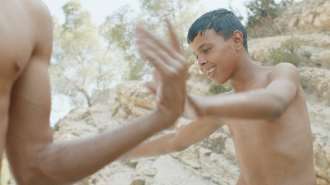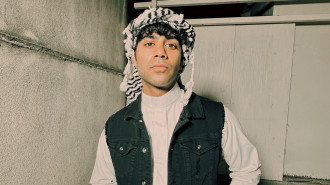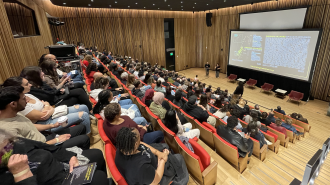
Catching a vibe: Nadine El Roubi's artistry is as elegant as it is enigmatic

Speaking through Google Meet from her room in Cairo, 26-year-old Sudanese artist and emcee Nadine El Roubi passionately explains that her identity is multifaceted, using her love for astrology and her faith in God as her guide to better understanding the ways in which we as humans embody the elements.
"My identity as an Afro-Arab woman is hugely influential and the core of what I’m trying to do, just through the music and the stories and how I’m trying to tell them"
“Everybody has all of the elements in their chart. For me, that’s just an indication of how we all have different sides to us. Whether you believe in astrology, religion, spirituality, whatever it may be, we all have different aspects of our personality.”
Embracing all dimensions of our humanity not only continues to be a core belief for Nadine but is also emblematic of the approach to her music.
With the sultry voice of Lana Del Rey, the experimentation of Doja Cat, and the confident lyrical flow of A$AP Rocky, Nadine describes her sound as a “divine, kind of feminine” energy. That exact vibe creates a whole other level for an already strong-yet-under-the-radar Sudanese hip-hop and R&B scene.
The Middle East and North Africa region boast arguably one of the top global hip-hop scenes in terms of lyricism, production, and overall success. And while much of the focus tends to be on Moroccan and Egyptian emcees, those who have been following hip-hop’s growth in Sudan know that their artists can contend with anyone and deserve similar recognition.
Make no mistake, Nadine is the perfect artistic and creative ambassador for Sudan, its diaspora, and, frankly, for the region.
Growing up in Virginia as a child in the United States, she knew from the moment she learned how to read that she was an artist. Nadine memorised and “regurgitated” lines from movies. And when she would read to her sister, Nadine shared she created different voices for each character in the books.
Music, however, clicked for her like no other art form.
“I was always kind of writing music to myself, not even taking it seriously but something I found fun to do as a challenge for myself,” Nadine shares candidly. “But never obviously feeling comfortable enough to share it with anybody.”
She gravitated toward the piano and played for ten years of her life, memorising and performing Bach pieces at recitals in high school.
Nadine remains acutely aware of her life experiences and her identity, and how both shape her production and songwriting processes.
Spending time between Virginia, the UK, Sudan, and Egypt, Nadine recognises how her privilege has allowed her to move around and explore those dimensions of her identity.
“I soaked in that element of pop culture in the US. Being in the UK and being exposed to UK slang has influenced how I write a little bit. Being in Sudan and Egypt, it’s less so the music styles but more so the kinds of stories that I tell. My identity as an Afro-Arab woman is hugely influential and the core of what I’m trying to do, just through the music and the stories and how I’m trying to tell them.”
"When you reframe people’s perception of a stereotype, it has a domino effect of how people talk about those people or the kinds of opportunities those people get or the spaces they’re allowed into"
More than anything else, Nadine sees herself as a storyteller. In the vein of her musical inspirations Erykah Badu, Kendrick Lamar, Lauryn Hill, and J. Cole, she realises how critical it is to observe the world and put those observations into words – and to be an artist of the moment.
Nadine’s music provides insight into her thoughts and feelings at that exact point in time, or as she calls it, “channelling”.
“I rarely sit down with a concept in mind,” she explains. “I’m more so ‘if I catch a vibe, I catch a vibe’ When I’m in this space, and things are just flowing, and even if I’m thinking about something deeply with this intention, it kind of just rolls. When it flows, it’s just a blessing.”
|
Her latest track, released last Friday, exemplifies “catching a vibe” in every sense of the phrase. A ten-minute compilation of verses Nadine has written and shared over the years since 2018 – sequenced by Nadine herself with voice notes from friends during that time – it tells the story of her coming of age as an artist.
“Having it be a 10-minute compilation just represents this feeling for me of zoning out and just listening to music and not caring how long the music goes on and not caring about my outside environment. There are recurring themes of stepping into your power and feminism and my takes on certain things in the world. There’s a throughline of trying to understand yourself and trying to understand the world.”
Nadine is gearing up for the release of her first EP, Triplicity, another word for “element” – stemming from her love of astrology. The EP, coming out in October of this year, intentionally includes different vibes and genres across each track, maintaining an organic, raw, and cohesive vision that bridges the culture and attitudes of artists from the region can be.
“When you reframe people’s perception of a stereotype, it has a domino effect of how people talk about those people or the kinds of opportunities those people get or the spaces they’re allowed into. When you show that an Arab and Muslim woman can say certain things, do certain things, and perform a certain way, we can cast or create a character who doesn’t wear a hijab, is comfortable with her sexuality, does art and is supported by her parents in that. You shift the paradigm of what that looks like and let it flow into different spaces.”
Ultimately, it is Nadine’s mission as an artist to demonstrate creativity and versatility through her music. To put a label on it, or box her in, would do a disservice to her vision.
Danny Hajjar is a media relations professional based in Washington, DC. An avid music lover, he is passionate about hip-hop artists in the Middle East and North Africa and the growth of their music beyond the region. He curates music and stories in his weekly newsletter “Sa’alouni El Nas”.
Follow him on Twitter: @DanielGHajjar






 Follow the Middle East's top stories in English at The New Arab on Google News
Follow the Middle East's top stories in English at The New Arab on Google News


